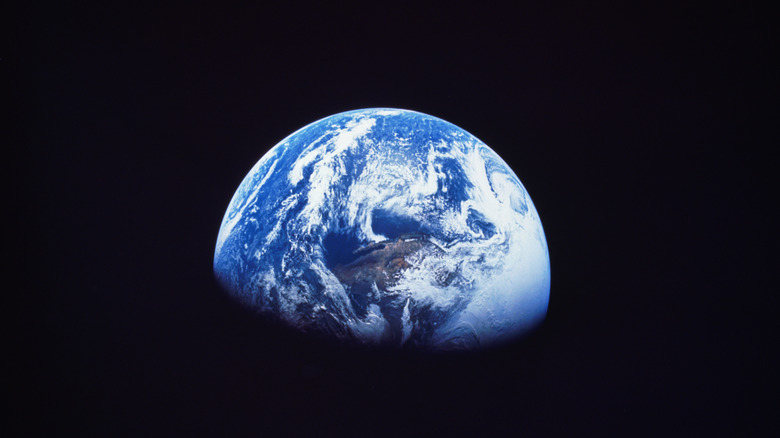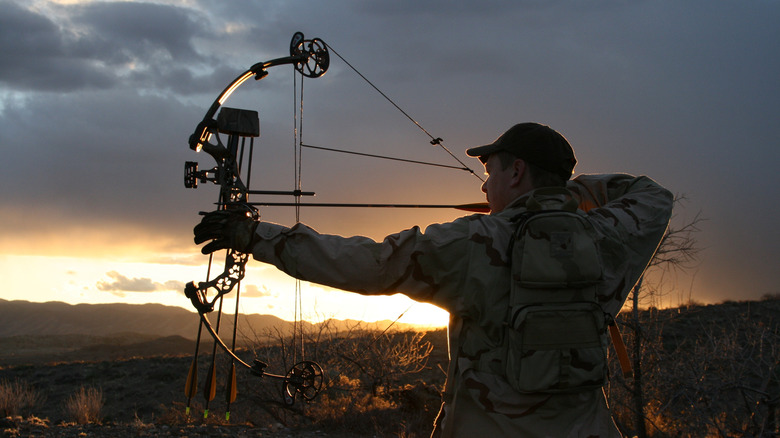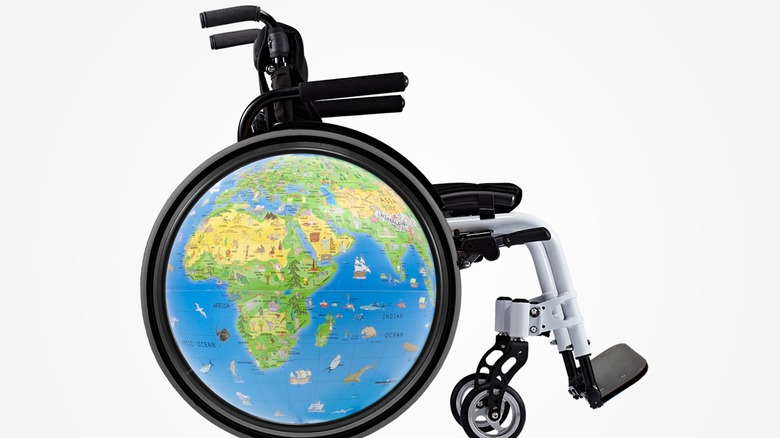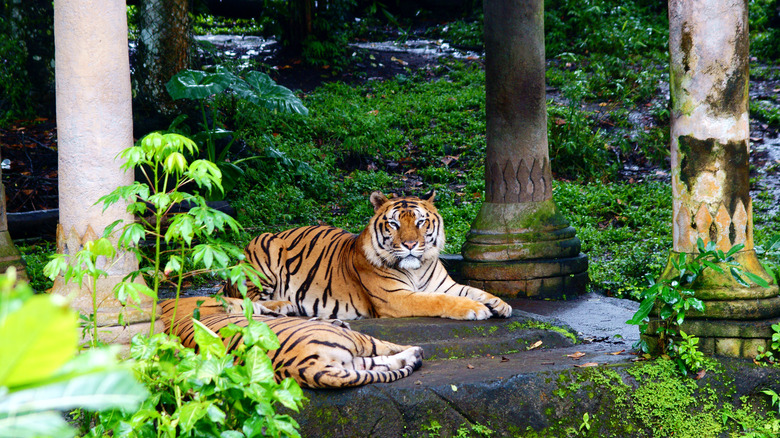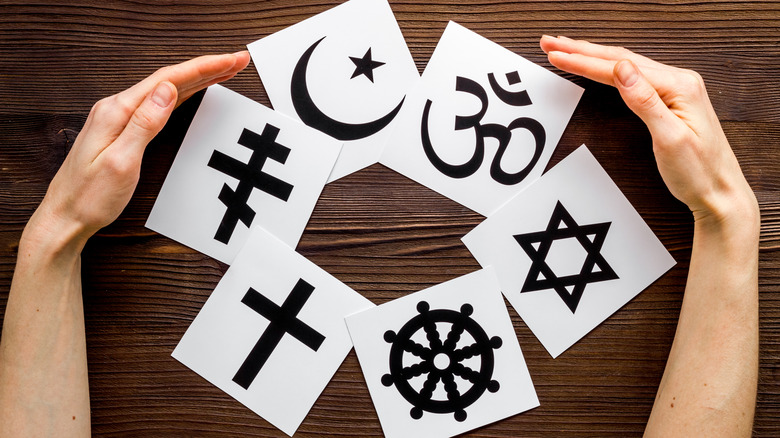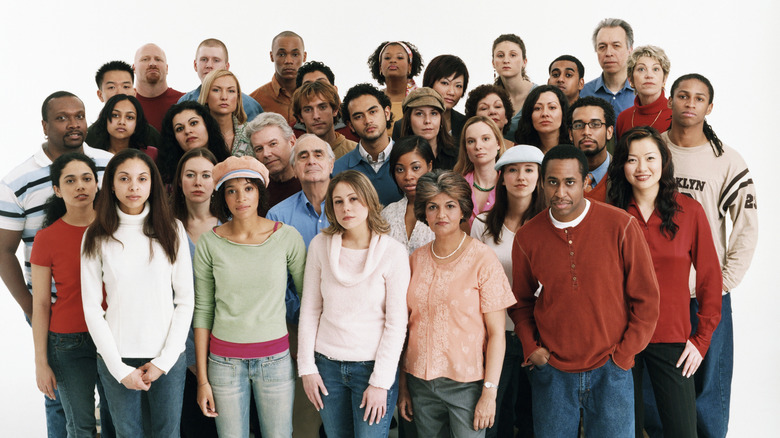How The World Would Look With Just 1,000 People
Imagine if you would, an apocalypse of some kind. Maybe a killer pandemic or perhaps space aliens teleporting humanity to go work spice mines in the Orion constellation. Or maybe it's a scenario like the 1984 B-movie "Night of the Comet" where when a comet passes close enough to Earth to vaporize everybody to dust or turn them into some sort of weird undead creature. Whatever it may be, this existential crisis (and thought experiment) would leave a random selection of 1,000 people behind. This would be a representative sample of people around the world today — sans the zombies. Then imagine after the initial shock of discovering an empty world, these 1,000 survivors manage (don't worry about how) to find a way to gather in one place.
What would this new society look like? It wouldn't exactly be Mayberry but would it be as confusing as the Tower of Babel? How would the world, outside of humans, be different? Let's take a look and see how.
Not that many people would farm
With a world of 1,000 humans, people would be rightly concerned about obtaining food. This subject carries concerns. Data from the World Bank shows that the number of farmers worldwide has declined from 44% of the world's population in 1991 to 27% in 2019. In its analysis of this problem, the BBC states that young people have spurned agriculture as a livelihood, citing hard work for little reward. The shortage of farmers contributes to food insecurity problems throughout the globe. This means that in the thought-experimental post-apocalyptic world of 1,000 people, only about 270 are farmers.
The World Food Programme states that, in our regular world, "as many as 828 million people are unsure of where their next meal is coming from." But, would a 1,000-person world be food scarce? It depends. The American Farm Bureau Federation says that in the United States, only 2% of the population are farmers and ranchers who produce a food surplus. So if agricultural technology is maintained, it is likely that humanity won't starve. Yet maintaining current levels of technology with such a low population may be well nigh impossible, since "Innovation and the Growth of Human Population" argues that population size and the rate of technology growth are positively linked. With so few people who know how to use that farming equipment and the basics of growing food, productivity could easily collapse, and new farming innovations might be non-existent.
There might be one hunter-gatherer
With only 1,000 people around, they rightly may be more concerned with survival than say, designing social media memes. Sadly, there would hardly be a single person in this society equipped with the skills to hack out a living in the wilderness.
In 2018, the Proceedings of the National Academy of Science published an article that studied hunter-gatherer populations. They estimated that there are about 10 million people divided among 300 different hunter-gatherer societies. In a world with 8 billion people, this equates to roughly 0.125% of the world's population. When this percentage is applied to a population of 1,000 there is a good chance that nobody will have a hunter-gatherer background and if there happens to be one, it is likely to be a single individual. This lack of traditional skills might endanger the entire population.
Of course, some people who are not hunter-gatherers learn survival skills such as Boy Scouts, Girl Scouts, and Les Stroud. There are about 2.2 million and 2.5 million Boy and Girl Scouts, respectively. That is, there are fewer of them than hunter-gatherers so the remnant of humanity may be doomed unless they can find a DVD of Bear Grylls shows.
Job specialization would vanish
Demographics aside, there are certain realities as to what the world would look like with 1,000 people. One of the big and immediate changes is that job specialization and division of labor would be reduced or disappear entirely.
According to an article entitled "Behavioral Specialization During the Neolithic," as populations grew during the Agricultural Revolution, people started to become specialized in their occupations. For example, a person could specialize in making pottery and exchange their product for food. This type of economic system is only possible in large groups. Prior to this change, when humans were hunter-gatherers, specialization was impossible since such small groups required everybody in the group to contribute to survive. The authors of the article write, "...as the number of tasks grows, an ever larger group or a well-connected meta-population is needed for maintaining specialist groups, and the minimum size of the group increases very fast with the number of tasks."
What this means is that in a 1,000-person society, office skills such as calculating revenues, filing reports, or brokering recycled paper are useless. People would be more concerned about keeping themselves fed and housed. As a result, humanity would need to very quickly revert to a hunter-gatherer form of living or more would become farmers. However, as noted before, the new world would be poorly equipped with people to teach these all-important skills.
There would be only one doctor
If you are one of the 1,000 people left on Earth, you would naturally be concerned about maintaining your health. So how many doctors would there be? Frighteningly, the answer is not many. World Bank data tells us that there are about 1.6 physicians per 1,000 people. So while this means that there should be at least one doctor, that person will have 999 patients — a scheduling nightmare.
Then there is the problem of what kind of doctor it is. For example, would a world of 1,000 people be better off with a brain surgeon or a podiatrist? While there is no clear data worldwide, in the United States, the Association of American Medical Colleges shows that the largest specialty is internal medicine followed by general practice. This means that the odds are that the physician in the post-apocalyptic world will be a generalist, which is probably the most useful for minor issues, but in a world where the knowledge of modern medicine has essentially been wiped off the planet, even small issues will quickly become big problems, as life-saving basics like antibiotics run out.
While less deadly, also concerning is the related question of dentists. An older study in the International Dental Journal cited that there is fewer than one dentist per thousand people. Assuming these numbers still hold up, this means plenty of tooth decay for the surviving human population.
There would be more younger people than older people
Demographically, a world with a random but representative assortment of 1,000 people around the world would skew young. World demographic data collected by the United Nations shows that the median age of humans worldwide is 30. The U.N.'s data on percentages of people by age group also reveals what can be expected to translate in a world of 1,000. For example, 22.2% of the world's population were between the ages of 0 to 4 in 2021. This would translate to 222 of the post-apocalyptic world of 1,000. This young society becomes clearer since over half of the world's population is between the ages of 0 to 19 (52.8%) which translates to 528 people.
Looking at the other end of the age spectrum, there would be relatively few elders. Those over 65 years of age comprise only 4.8% of the population meaning that there would be 48 of these older cohorts in the world of 1,000 people — only one of whom is a doctor, remember, most likely making old age increasingly difficult to attain.
The implications of this are obvious: society will be young and focused on youth. This might be a good thing. The U.N. tells us that countries with young populations have accelerated economic growth. However, the downside is that societies with younger populations tend to be politically unstable. The few older people will hopefully come to be treated as respected elders based on their experience, as they have been in many traditional societies, and perhaps this would help stabilize the 1,000-person world.
There would be many disabled persons
A world with 1,000 people would also have a large number of people with disabilities. The World Health Organization (WHO) records there are 1.6 billion people in the world today with a disability. In its report on the subject, WHO defines disability as "difficulties" people encounter with functioning day-to-day due to health factors. These include impairments in body function such as blindness or deafness, trouble conducting basic activities such as walking or eating, or facing restrictions from participating in human activities. However, disabilities occur on a spectrum from moderate to severe. The WHO writes, "Persons with disabilities are diverse and heterogeneous, while stereotypical views of disability emphasize wheelchair users and a few other 'classic' groups such as blind people and deaf people."
Since the WHO lumps so many people with different levels of disabilities together, the 1.6 billion translates to about 20% of the world's population or 200 persons in a world of 1,000 people. What will happen to them? It may be grim. Many historians believe that ancient Sparta rid itself of children perceived to be less-than-perfect by leaving them to die through exposure. Some countries today, such as Mauritania, have been reported to ostracize disabled children with families even hiding them.
On the other hand, when thousands upon thousands of veterans returned home from World War I with various mental and physical issues, it jumpstarted the Disability Rights Movement. In the 1,000-person world, such visibility might make disabilities normalized and society could work harder to accommodate them.
It would be environmentally and ecologically friendly
If Earth had a persona it would no doubt be thankful for a 1,000-person world. The fact is that with so few humans, all the environmental stresses caused by people would virtually vanish. Auto emissions would be nil. There would be reforestation and most wild species would benefit from the nearly vanished human footprint. Disruptr explored the question as to what would happen if all humans vanished in an interview with Associate Professor Mike Weston from Deakin University. He predicts that while wildlife would quickly repopulate the planet, domesticated animals might die out, so in a world with few people, the remnant of humanity would have to actively work to preserve them. In addition, populations of animals that are not domesticated but have thrived in symbiosis may suffer population shocks. Think of rats, pigeons, seagulls, and maybe the occasional sewer alligator.
Still, on the whole, Professor Weston imagines a healthier world stating, "I imagine a greener, cooler, more biodiverse place." When considering how depopulated areas such as Chernobyl ecologically recovered with humans absent, it is easy to picture.
However, at the same time, the world would have been forever and indelibly transformed by the humans that came before the great apocalypse. Buildings would fall into ruin and serve as the new ecosystems for animals. The 1,000 people who are left would look at the ruins of humanity's past, marvel at what came before, and wonder what the heck happened.
People would have a hard time understanding one another
In a world with 1,000 people, one of the chief difficulties would be language barriers. There are over 7,100 languages spoken in the world today. The language website, Ethnologue, points out that even though there are thousands of languages, the vast majority of people are speakers of only a handful of them, meaning the 1,000-person world will see many languages with very few native speakers, possibly leading to a breakdown in communication unless everyone agrees on a lingua franca, like English is in our regular world.
The most spoken language in the world today is English with 1.5 billion speakers which is almost 19% of the world's population and Mandarin Chinese at 1.1 billion which is almost 14%. Thus, in a world of 1,000 people, 190 individuals would speak English and 140 would speak Chinese. The third most spoken language is Hindi, which has 602.2 million speakers or 7.5% of the world's population. Therefore, in a world of 1,000, there would be 75 Hindi speakers. From there other languages would be spoken by fewer and fewer people, isolating those speakers from many other survivors.
But the multilingual 1,000-person world would not necessarily be like the Tower of Babel. The tiny country of Luxembourg, for example, has three primary languages: French, German, and Luxembourgish. Despite these differences, the small country is a prosperous democracy.
One person would be a trained soldier
Since time immemorial humans have waged war upon each other. In fact, the Center for Strategic and International Studies says that the outlook for peace in the world is growing worse stating in a report, "It is all too clear that the relations between the great powers, and between the more advanced and developed democracies and authoritarian and repressive states, have shifted from the image of cooperation to active confrontation."
With that said, one might expect that in a 1,000-person world, a fair number of people who come from a random sampling of humans today would be of military ilk. The truth is rather surprising. World Bank shows that in 2019, 27.6 million people were service members of the armed forces around the world. This equates to .35% of the world's population. Thus, in a world of 1,000 people, there may or may not be one person who is active military. However, there would likely be a veteran or two.
Does this mean a world without war? There is always hope. A Rutgers University Newark study published in Scientific American argues that while humans certainly kill on an individual basis, war is not an innate trait. The author writes, "War is fostered by culturally specific systems of knowledge and values that generate powerful meanings of 'us versus them.'" And in a 1,000-person world, is there really much of a them to speak of?
Most people couldn't swim
One key skill for those who want to survive is swimming. Regrettably, in a world of 1,000 people, most would be unable to swim. Gallup analyzed a Lloyd's Register Foundation World Risk Poll and found that 55% of humans aged 15 and older could not effectively swim. If we assume those younger than 15 (who, remember, make up a very large percentage of this population) are even less likely to have learned how to swim yet, that means only a few hundred people who know how to swim in the 1,000-person world.
Interestingly, and what demonstrates the chasm between different countries of the world today, the swimmers in this world would mainly come from countries that were wealthy before the apocalypse. The data shows that 76% of people from high-income countries know how to swim as compared to 27% from poor countries. Also even in wealthy countries, there is a big difference between whites and minorities, as the latter are less likely to have learned how to swim. What is more, there would be a sex divide among swimmers. Around the world, 57% of men can swim compared to only 32% of women.
All of this data shows that in a world of 1,000 people, humanity would be far better off in an inland enclave rather than the ruins of a former seaside resort. Hurricanes, floods, and even crossing rivers would suddenly be even deadlier for this small, isolated society.
Most people would be one of three religions
If there were one thousand people in the world, most people would follow a religion, but three of these religions would predominate. The Pew Research Center conducted a study concerning the breakdown of religions by size as a portion of the world's population. They found that of the different religions, Christianity, Islam, and Hinduism were the most dominant being practiced by 31.5%, 23.2%, and 15% of the population respectively.
If these percentages are applied to a population of 1,000 people, this means that a little over 310 people would be Christian, a bit over 230 Muslim, and 150 individuals Hindu. Other religions would be much smaller. For example, by applying the Pew percentages, there would be just over 70 Buddhists and 20 Jewish people in a world of 1,000 persons. People who practice various folk religions which may include native traditions throughout the world would account for about 59 people.
With statistics like these, society would be religiously pluralistic, but the long-term notion of peaceful toleration may be remote since multiple religions in one place is usually trouble. For example, in the 20th century, Lebanon ran a republic represented by blocs of Christians and Muslims. In 1975, differences between the groups were insurmountable, resulting in a civil war that lasted for over a decade killing over 100,000 people.
There would be a population bottleneck
When looking at a world of 1,000 people one may wonder what the ethnic makeup of such a society would be. This is actually a fairly tricky question; ethnic makeup is not easily measured since people may be of several ethnic groups or it is unclear to which one a person belongs. A little more accurate is measuring from where people originated.
Statista provides a breakdown by continent of the world's population. In its analysis, it places 59% of the world's population in Asia with nearly 18% from Africa. In the hypothetical 1,000-person world, this would mean that 590 come from Asia and 180 from Africa. Representation from the other continents would be quite small. For example, there would be only 47 people from North America and 93 people from Europe.
The 1,000-person world would be genetically diverse at first. This would be helpful in the long run since a 1,000-person population will result in a genetic bottleneck. Over time, these initial survivors will have children and, eventually, there will be interbreeding. Genetic diversity will start to diminish and the population would become susceptible to disease and find it harder to adapt. In the long run, humanity may be doomed to some future pestilence or disease to which it cannot adapt.
